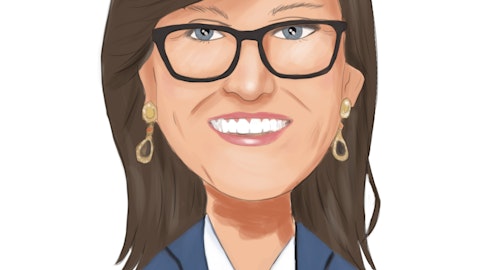2. Delta Air Lines, Inc. (NYSE:DAL)
Number of Hedge Fund Holders: 55
Delta Air Lines, Inc. (NYSE:DAL) is an Atlanta, Georgia-based airline that reported its Q2 2022 results on July 13.
Delta Air Lines, Inc. (NYSE:DAL) saw its revenue increase by 93.5% YoY to $13.8 billion and surpassed the consensus estimate of $13.4 billion as airlines across the US had the best summer in the past three years. However, the company missed bottom-line estimates due to rising costs that are expected to remain inflated during the second half of 2022. The airline industry is also facing an intense shortage of labor. Delta Air Lines, Inc. (NYSE:DAL) was forced to cancel 3.5% of its flights in June. Although the company has achieved 95% of its pre-pandemic employee headcount, Delta Air Lines, Inc. (NYSE:DAL) is still short-staffed due to training backlogs.
Following the earnings report, Delta Air Lines, Inc. (NYSE:DAL) stock was downgraded from a Buy to a Hold rating by John Staszak at Argus on July 15 with no price target. The analyst cited earnings miss, reduction in capacity, and shortage of staff as the key reasons for the downgrade.
Miller Value Partners presented its outlook on Delta Air Lines, Inc. (NYSE:DAL) in its Q4 2021 investor letter. Here’s what the firm said:
“We’ve healed greatly from the worst days of the pandemic, and we expect that to continue going forward. We see the greatest disconnects between current market expectations and 18-months-out fundamentals in names like Delta Airlines (DAL).
Delta is a quality airline with shareholder-friendly management. It was the only one not to issue equity during the pandemic. It was also the only profitable airline in the second half of 2021. It generated positive operating cash flow despite business and international travel weakness. When earnings finally normalize, which the company doesn’t expect until 2024, it should earn more than $7/share. After bouncing significantly off the lows, DAL currently trades at $41.99 or less than 6x those earnings.
We’ve believed for over a decade that the US airlines are better businesses than they’ve historically been. Consolidation led to a more rational industry. These companies shifted from growth at any cost to a return on capital mindset, the importance of which can’t be understated. We previously believed a recession would finally demonstrate the group’s improved resilience.
Unfortunately, a global pandemic did exactly the opposite. Buffett, who bought the airlines after being a critic of their historical capital destruction, sold his airlines early in the pandemic due to the risk. The government offered support to the industry due to their national strategic importance, which we believe offers protection against another worst-case scenario. We still believe Delta is a better business than the market gives it credit for and one whose prospects will be materially different 18 months from now. As patient investors, you can expect us to hold tight.”
Delta Air Lines, Inc. (NYSE:DAL) was held by 15 hedge funds as of Q1 2022.




